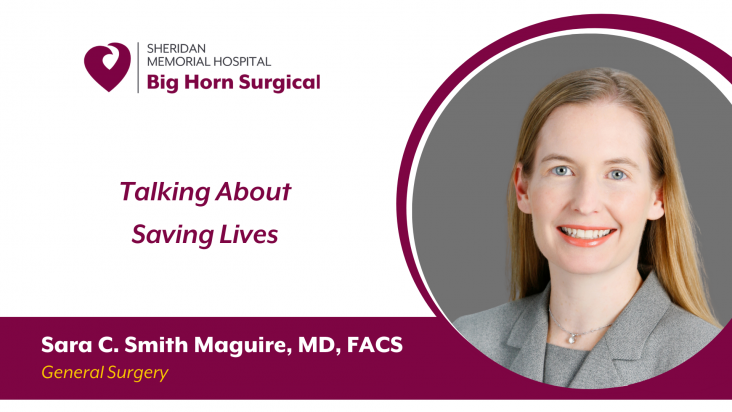By Sara C. Smith Maguire, MD, FACS, of Sheridan Memorial Hospital’s Big Horn Surgical Practice
It may not be the most glamorous subject, but talking about colorectal cancer saves lives. Unlike many cancers, we have effective tools to help decrease the development of colorectal cancer and identify its presence at an earlier stage.
The risk of colorectal cancer increases with age, with more than 90% of the cases we see being diagnosed in people age 50 or older. Most colorectal cancers are diagnosed in people who do not have a family history of colon cancer. There are many factors that are associated with an increased risk of colorectal cancer. Some of these risk factors are related to lifestyle choices and are therefore modifiable. Maintaining a healthy weight, being physically active, not smoking or chewing tobacco, avoiding heavy alcohol intake and eating a balanced diet that limits intake of red or processed meat can all help decrease your risk of colorectal cancer.
Some risk factors can’t be changed. Colorectal cancer is more common as we age. It is also more common in people with a personal history of adenomatous colorectal polyps or a previous colon cancer. Being diagnosed with an inflammatory bowel disease, particularly ulcerative colitis, increases your risk.
Colorectal cancer may cause symptoms as it grows. These symptoms include seeing blood in or on your stool, unintentional weight loss, a change in bowel habits and weakness or fatigue caused by a low blood count.
Screening is the practice of looking for cancer or pre-cancer in individuals without symptoms. Screening is incredibly effective when it comes to colorectal cancer because from the time the first abnormal cells start to develop, it takes on average 10-15 years for those cells to become a colorectal cancer. Screening is one of our most effective tools for preventing colorectal cancer because it allows us to identify precancerous polyps and identify people who would benefit from more frequent screening. Screening can also identify small cancers that aren’t yet big enough to produce symptoms.
There are several screening tools for colorectal cancer, including colonoscopy which allows us to both find polyps and remove them at the same time. Talking to your doctor about your risk factors can help identify the most effective and appropriate screening test for you. In general, screening is recommended between the ages of 45 and 75, though there are reasons to start earlier or stop later for some people.
If you are 45 or older, it’s time to talk to your doctor about Colorectal Cancer Screening. It can save your life. If you have questions, the staff at Big Horn Surgical would be happy to assist you – call 307.673.3181.

